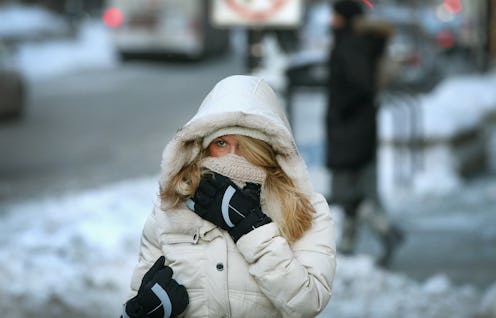Life
Being Cold Is Contagious
Have you ever glimpsed an image of some poor fellow in a cold climate and started shivering just a bit out of empathy? It wasn't just your imagination; coldness is contagious. Until recently the sensation hadn't been scientifically recreated, but one study has now proven that our bodies are capable of changing temperature based on just the depiction of someone else who's chilly; we mirror what we perceive they're feeling.
Empathy, explained as "the ability to understand and share the feelings of another," may need a slightly more thorough definition re-write. Especially given that the new generation's definition of empathy is pretty much just swapping mojito emojis, but I digress.
When researchers exposed 36 healthy people to videos of actors with their hands stuck in cold water, test participants' hands became significantly colder, almost matching the actors in the videos. However, when viewing those actors with a hand in what was depicted as warm water, there was no difference in temperature. Test subjects only reacted when they perceived the actor in the video's hand was too cold.
This is an important find, as it proves that more than simple emotion can be contagious; bodily states can be catching.
The researchers claim their findings are due to the fact that "empathetic understanding for primary low-level physiological challenges (as well as more complex emotions) are grounded in somatic simulation," or in human speak: we feel for people in these tough situations because we imagine we're experiencing them as well. They don't, however, suggest a deeper explanation for the phenomenon, such as a long-lost human mechanism for ensuring people protect or look out for one another when it's too cold.
What they do point out is that as human beings tend to mimic each other to most effectively communicate socially (think body posture, gestures, colloquialisms, facial expressions), this physiological response is just another way we connect socially.
Similar studies have shown that watching a stressed out person on TV can increase cortisol (stress hormone) in our own bodies. Even the heart rates of therapists and their clients tend to increase and decrease at some level of synchronicity.
In a time that empathy does seem to be such a dying trait, studies like these will be of more and more interest. When we're texting back and forth instead of speaking face-to-face, we're missing vital clues about each other's emotional states and what could be legitimate opportunities to build valuable relationships. Perhaps the proof that seeing and feeling for one another is so inherent to our natures would be enough to encourage us to venture out and actually see each other?
Meh.
If not, we'll always have GIFS to express our emotions.
Images: Getty (1); Giphy (1)
